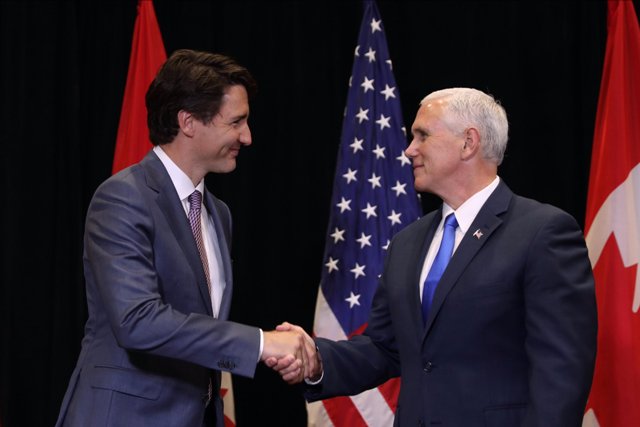
Trudeau, Pence to talk trade, China, abortion in final push to ratify new NAFTA [UPDATED]


Future U.S. plans for tariffs on uranium imports and the softwood lumber dispute are also on the agenda

Pence with Trudeau. PHOTO: Justin Trudeau/Twitter
OTTAWA–The ratification of the new North American trade agreement will dominate a packed agenda when Prime Minister Justin Trudeau and U.S. Vice-President Mike Pence meet today in Ottawa.
While Trudeau says he also wants to talk about what he calls the backsliding of women’s rights in the U.S. with Pence, a well-known opponent of abortion, other international issues—including Canada’s diplomatic battle with Chinawill also be up for discussion.
Pence arrived shortly before midday at the airport in Ottawa, disembarking from a Boeing C-32 bearing the familiar blue, white and gold markings of the U.S. executive branch—the airliner typically designated as Air Force Two. He and his wife Karen were promptly bundled into a black SUV for the motorcade journey into the national capital.
Trade will dominate the initial discussion between the two leaders, but while their focus will be on the pending ratification of the new continental trade pact, other remaining irritants will also be on the agenda, said a senior government official who spoke on the condition of anonymity because they were not authorized to speak on the record about the talks.
The ongoing softwood lumber dispute and future U.S. plans for tariffs on uranium imports, which would have a big impact if they applied to Canada, will also be raised, the official said.
The new deal doesn’t come into force unless all three countries ratify it; as Pence arrived in Canada, Democratic opposition in U.S. Congress was once again rearing its head in the form of a Connecticut Democrat opposed to the agreement.
“While the Canadians rush to approve this deal, Congressional Democrats remain committed to making key changes to the core of the agreement that will include strong labour and environmental standards and enforcement and remove the monopoly rights for Big Pharma,” said Rep. Rosa DeLauro.
“These key changes must be included in the text of the agreement in order for it to be considered in Congress. I encourage my colleagues in Canada to address these critical issues before passing the agreement.”
The Trudeau government has said the deal is done, and not open to further negotiation.
Pence and Trudeau will also discuss some larger, shared international concerns, said the official, including Canada’s ongoing tension with China, which has detained two Canadians on unspecified national security violations.
Trudeau and Foreign Affairs Minister Chrystia Freeland have branded the arrests of Michael Kovrig and Michael Spavor as arbitrary. They were imprisoned in December after the RCMP arrested Huawei executive Meng Wanzhou on a U.S. extradition warrant.
Canada has been courting international support to pressure China to release Kovrig and Spavor, and the Trump administration has joined that chorus.
The crises in Venezuela and Ukraine will also be on the agenda, Freeland said last week in Quebec.
The divisive abortion question is now on the agenda after Trudeau said Wednesday he is concerned about how women’s rights have been affected by conservative movements in Canada, in the U.S. and around the world. He said he will have a broad conversation with the vice-president.
Some states have recently passed anti-abortion laws, attempting to force the U.S. Supreme Court to reconsider its decision in the landmark 1973 Roe vs. Wade case that provides constitutional protection for a woman’s right to choose.
While Trudeau and Pence are on opposite of the abortion debate, the vice-president is viewed in Ottawa as a reliable partner on the trade file.
Last week, Freeland said Pence has been “a strong and effective supporter of free trade. He has been someone who has spoken out in the United States about the value of NAFTA for both Canadians and Americans.”
That contrasts with the Trudeau government’s frequent labelling of the Trump administration as protectionist, especially during the long and sometimes bitter NAFTA renegotiation.
When asked Thursday about the state of the cross-border relationship, Trudeau’s finance chief Bill Morneau told a business audience that there are clearly “flash points” with the Trump administration—but he said it’s important to consider the context.
The U.S., he said, is seeking changes to trading relationships in response to Americans who are frustrated with their situation.
“We have a really deep and broad relationship with the United States,” the finance minister said during a breakfast event hosted by the Milton Chamber of Commerce in the Toronto region.
“There will always be flashpoints, there’s just maybe a little more drama now than there has been in the past.”
Trudeau is to meet Pence on Parliament Hill before they attend a luncheon with the Canadian Council for the United States-Mexico-Canada Agreement.
The Liberal government introduced its legislation to ratify the new trade deal on Wednesday.
Trudeau said earlier this week that Canada intends to align its ratification process with the time frame of the U.S. Congress.
Pence is also to take part in a wreath laying ceremony at the National Military Cemetery before returning to Washington.
—with files from Andy Blatchford